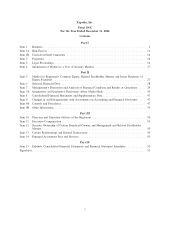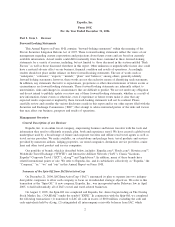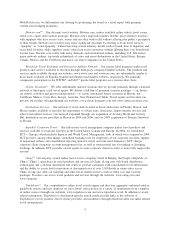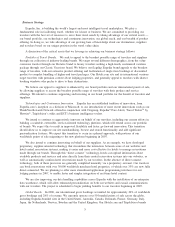Expedia 2006 Annual Report Download - page 17
Download and view the complete annual report
Please find page 17 of the 2006 Expedia annual report below. You can navigate through the pages in the report by either clicking on the pages listed below, or by using the keyword search tool below to find specific information within the annual report.employees, including relationships with employees represented by works councils or other similar
organizations.
Part I. Item 1A. Risk Factors
You should carefully consider each of the following risks and uncertainties associated with our company
and the ownership of our securities. Additional risks not presently known to us or that we currently deem
immaterial may also impair our business operations.
We operate in an increasingly competitive environment.
The market for the services we offer is increasingly and intensely competitive. We compete with both
established and emerging online and traditional sellers of travel services with respect to each of the services
we offer. Some of our competitors, particularly travel suppliers such as airlines and hotels, may offer products
and services on more favorable terms such as no fees and with unique access to proprietary loyalty programs,
such as points and miles. Many of these competitors, such as airlines, hotel and rental car companies, have
been steadily focusing on increasing online demand on their own websites in lieu of third-party distributors
like us. For instance, many low cost airlines, which are having increasing success in the marketplace, distribute
their online inventory exclusively through their own websites. Suppliers who sell on their own websites
typically do not charge a processing fee, and, in some instances, offer advantages such as their own bonus
miles or loyalty points, which could make their offerings more attractive to consumers than offerings like ours.
The introduction of new technologies and the expansion of existing technologies, such as metasearch and other
search engine technologies, may increase competitive pressures. Increased competition may result in reduced
margins, as well as loss of travelers, transactions and brand recognition. We cannot assure you that we will be
able to compete successfully against current, emerging and future competitors or provide differentiated
products and services to our traveler base. This competition may result in reduced margins, loss of segment
share and damage to our brand.
Over the last several years, we have experienced downward pressure on commissions and payments
to us from our suppliers.
A portion of our revenue is derived from compensation paid by travel suppliers and GDS partners for
bookings made through our websites. We generally negotiate these commissions and fees with our travel
suppliers and GDS partners. Over the last several years, travel suppliers have generally reduced or eliminated
commissions and payments to travel agents and other travel intermediaries. In particular, in 2006, GDS
partners faced the renegotiation of long-term contracts with airlines on terms that generally resulted in
decreased compensation to them. We also renegotiated several long-term contracts with airlines and GDSs
with reduced economic benefits. We are currently negotiating and expect to renegotiate other long-term airline
and hotel contracts in 2007. No assurances can be given that GDS partners or travel suppliers will not further
reduce current industry compensation or our compensation, either of which could reduce our revenue and
margins thereby adversely affecting our business and financial performance.
Declines or disruptions in the travel industry could adversely affect our business or financial
performance.
Our business and financial performance are affected by the health of the worldwide travel industry.
Accordingly, downturns or weaknesses in the travel industry could adversely affect our business. Travel
expenditures are sensitive to business and personal discretionary spending levels and tend to decline during
general economic downturns. Events or weakness in the travel industry that could negatively affect our
business include price escalation in the airline industry or other travel-related industries, airline or other
travel-related strikes, airline bankruptcies, liquidations or consolidations and fuel price escalation. Addition-
ally, our business is sensitive to safety concerns, and thus our business may decline after incidents of actual
or threatened terrorism, during periods of political instability or geopolitical conflict in which travelers
become concerned about safety issues, as a result of inclement weather such as hurricanes or when travel
might involve health-related risks, such as avian flu. Such concerns could result in a protracted decrease in
11
























